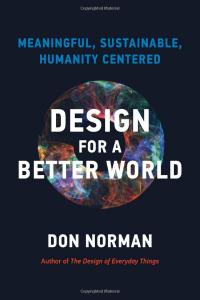 Design for a Better World: Meaningful, Sustainable, Humanity Centered
Design for a Better World: Meaningful, Sustainable, Humanity Centered
MIT Press, 2023
Agent: Sandra Dijkstra
How human behavior brought our world to the brink, and how human behavior can save us.
The world is a mess. Our dire predicament, from collapsing social structures to the climate crisis, has been millennia in the making and can be traced back to the erroneous belief that the earth’s resources are infinite. The key to change, says Don Norman, is human behavior, covered in the book’s three major themes: meaning, sustainability, and humanity-centeredness. Emphasize quality of life, not monetary rewards; restructure how we live to better protect the environment; and focus on all of humanity. Design for a Better World presents an eye-opening diagnosis of where we’ve gone wrong and a clear prescription for making things better.
Norman proposes a new way of thinking, one that recognizes our place in a complex global system where even simple behaviors affect the entire world. He identifies the economic metrics that contribute to the harmful effects of commerce and manufacturing and proposes a recalibration of what we consider important in life. His experience as both a scientist and business executive gives him the perspective to show how to make these changes while maintaining a thriving economy. Let the change begin with this book before it’s too late
Reviews:
"Norman (founding dir., Design Lab, Univ. of California–San Diego; Living with Complexity) looks out on a world beset by climate change, inequality, and unconscionable waste. Nonetheless, he is optimistic. He believes that humans can change what they’ve created. Design is the key, for it can mobilize systems to address the complex interface that technologies, policies, and people have."
—Library Journal
"Don Norman has worked in electrical engineering, cognitive psychology, computer science and design, in academia and industry. Now in his eighties, he draws on this experience to explain how designers, governments and industry must “broaden the notion of design from human centred to humanity centred”. In other words, they must emphasize quality of life, not monetary rewards, and reject harmful economic metrics. Only thus, he argues, will we survive the current environmental and economic crises."
—Nature
"Norman’s book is admirably ambitious."
—Fast Company's Co.Design